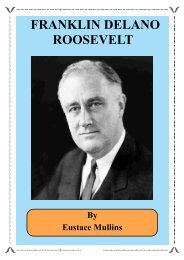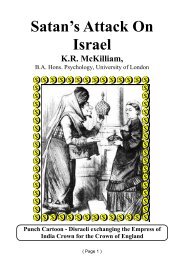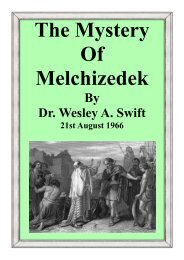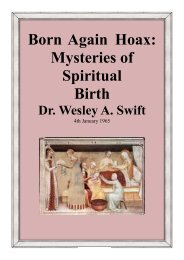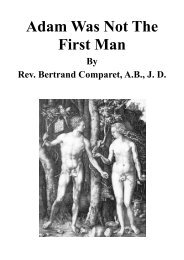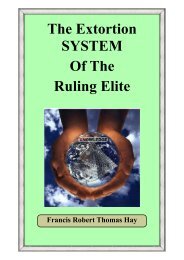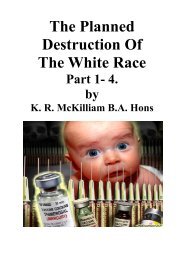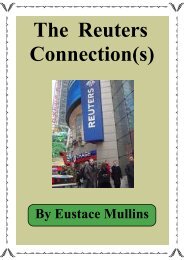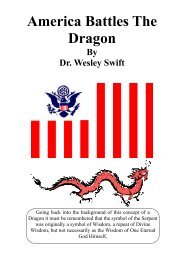Curse of Cannan - The New Ensign
Curse of Cannan - The New Ensign
Curse of Cannan - The New Ensign
You also want an ePaper? Increase the reach of your titles
YUMPU automatically turns print PDFs into web optimized ePapers that Google loves.
Marcinkus, a native <strong>of</strong> Chicago, who had been in charge <strong>of</strong> the Vatican's finances. <strong>The</strong> bank<br />
failure cost the Vatican $250 million, although its liability at one time was estimated to be some<br />
$3 billion. Archbishop Marcinkus was in charge <strong>of</strong> the Instituto per Ie Opere di Religione, the<br />
Vatican's Institute for Religious Works, which controlled its finances. <strong>The</strong> scandal was not really<br />
about banking, but about Freemasonry.<br />
Lord Sackville had established the first Masonic Lodge in Italy in 1733; by 1861, Italy was<br />
beginning to organize as a world power. <strong>The</strong>re were then three Masonic groups in Italy, at Turin,<br />
Naples, and Palermo. Garibaldi succeeded in uniting them in 1864 and thus became the most<br />
powerful political leader in Italy; so great was his reputation that President Lincoln asked him<br />
to become Commander-in-Chief <strong>of</strong> the United States Army during the Civil War. When<br />
Mussolini came to power after the First World War, he declared Freemasonry" a danger to the<br />
peace and quietude <strong>of</strong> the State." <strong>The</strong> Lodges were proscribed by the Anti-Masonic Law <strong>of</strong> 1925,<br />
which unleashed a furious worldwide propaganda campaign against Mussolini as a "dictator."<br />
After World War II, some five hundred Lodges promptly resurfaced in Italy. <strong>The</strong> Lodges were<br />
lavishly financed with ass funds thoughtfully provided by the taxpayers <strong>of</strong> the United States.<br />
Money was coming in such amounts that a super-secret group was required to handle it. One<br />
Lido Gelli had joined t he Grand Oriente d'Italia in 1963; he now organized a new lodge, which<br />
he called Propaganda Due, or P-2. It was named titer Mazzini's Lodge, Propaganda Uno, which<br />
he had founded to lead the Revolution <strong>of</strong> 1848. Gelli assumed the Masonic title <strong>of</strong> "supremo<br />
regulatore dell universo," Supreme Rugulator <strong>of</strong> the Universe. Within a short time, almost every<br />
prominent <strong>of</strong>ficial, banker, and editor <strong>of</strong> Italy was a member or! P-2.<br />
P-2 became deeply involved in many underhanded banking transactions, including control <strong>of</strong><br />
Banco Ambrosiano. Another bank was set up, Banco Privata, which seemed to be a vehicle for<br />
funds which had been hidden since World War II, OSS millions which had been stashed in secret<br />
hiding places. <strong>The</strong> principals <strong>of</strong> Banco Privata would indicate this; they included John<br />
"McCaffery, the Italian representative <strong>of</strong> Hambros Bank (Charles Hambro has been head <strong>of</strong> SOE,<br />
British Intelligence in London); he purchased 24.5070 <strong>of</strong> Banco Privata for Hambros; Michael<br />
Sindona bought 51 %. Sindona later sold Banco Privata to the lOR through Archbishop<br />
Marcinkus; the control was shifted to a Sindona firm in Lichtenstein, Fasco A. G. Another holding<br />
company, La Centrale Finanzaria, was set up by Sindona, which had Robert Calvi, Evelyn de<br />
Rothschild, and Jocelyn Hambro on its board. Sindona was soon moving $49 billion in<br />
Eurodollars through this and other bank holding companies which he operated. He netted some<br />
$10 million in pr<strong>of</strong>its. Banco Ambrosiano was at the vortex <strong>of</strong> all this activity; it went bankrupt.<br />
Gelli withdrew $50 million and fled to Switzerland, where he was arrested. Calvi was found<br />
hanging from the Blackfriars Bridge in London. Sindona, who also was involved in the collapse<br />
<strong>of</strong> the Franklin National Bank in <strong>New</strong> York, was arrested and sentenced to prison. He died in an<br />
American prison. Before his death, he explained to an interviewer the complexities <strong>of</strong> the great<br />
grain swindle, when the Soviet Union bought wheat from the United States in July, 1972. <strong>The</strong><br />
Soviet Union was allowed to pay for its purchases in the following manner: the central bank <strong>of</strong><br />
Hungary, acting for the Soviet Union, placed an order to sell the dollar short for $20 billion;<br />
Secretary <strong>of</strong> the Treasury John Connally then devalued the dollar by 10%; the Soviet Union<br />
made $4 billion on its short selling operation, and paid for the grain; they had $2 billion pr<strong>of</strong>it<br />
from the short selling operation and $2 billion from the 10% devaluation <strong>of</strong> the dollar. Sindona<br />
observed, "In its fathomless naivete, the United States has provided the Soviets with $4 billion,<br />
money that has since doubtless been invested in the destruction <strong>of</strong> its benefactors; I began to see<br />
then that America was the consort <strong>of</strong> her own ruin. I tell you, in all <strong>of</strong> history, no power has so<br />
blindly armed and succored its enemies as she."<br />
In fact, "America" is not encompassing its own destruction; it is being destroyed by the Masonic<br />
Canaanites who have infiltrated its highest <strong>of</strong>fices, and who now employ their power to destroy<br />
the people <strong>of</strong> Shem and the Republic which they established.<br />
<strong>The</strong> Calvi murder brought some interesting names to the surface, including one Francesco<br />
Pazienza, a Washington figure who was close to former Secretary <strong>of</strong> State, General Haig; Flavio<br />
( Page 33)



